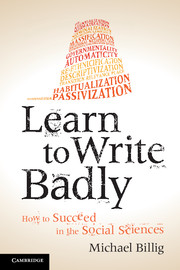Book contents
- Frontmatter
- Contents
- Acknowledgements
- 1 Introduction
- 2 Mass publication and academic life
- 3 Learning to write badly
- 4 Jargon, nouns and acronyms
- 5 Turning people into things
- 6 How to avoid saying who did it
- 7 Some sociological things: governmentality, cosmopolitanization and conversation analysis
- 8 Experimental social psychology: concealing and exaggerating
- 9 Conclusion and recommendations
- References
- Index
8 - Experimental social psychology: concealing and exaggerating
Published online by Cambridge University Press: 05 June 2013
- Frontmatter
- Contents
- Acknowledgements
- 1 Introduction
- 2 Mass publication and academic life
- 3 Learning to write badly
- 4 Jargon, nouns and acronyms
- 5 Turning people into things
- 6 How to avoid saying who did it
- 7 Some sociological things: governmentality, cosmopolitanization and conversation analysis
- 8 Experimental social psychology: concealing and exaggerating
- 9 Conclusion and recommendations
- References
- Index
Summary
In this chapter, I will be turning from sociology to social psychology, in order to examine some of the literary practices that experimental social psychologists customarily use. In a way, this is a move from the centre of the social sciences to its boundary with the natural sciences. The majority of social psychologists like to think of themselves as scientists, conducting proper experiments. Many would be surprised to hear that they have a literary style, because they would claim just to stick to ‘the facts’ and to write with the sort of clarity that befits any natural scientist. But, as I want to argue in this chapter, it is not quite so simple and experimental social psychologists have some rhetorical habits which are well worth critically examining.
Some very vocal critics have contrasted the waffle of the social sciences with the precision of the natural sciences. If one paid attention to scientists such as Richard Dawkins and Alan Sokal, one might gain the impression that the root of all problems in the social sciences lies in the pretentiousness of continental literary theory. In the words of Sokal, much big theory today is ‘fashionable nonsense’, designed to impress those who lack the intellectual resources and scientific education to see through its pretences (Sokal and Bricmont, 1999). Dawkins asks his readers to imagine being ‘an intellectual impostor with nothing to say, but with strong ambitions to succeed in academic life’. What sort of literary style would you adopt? He answers: ‘Not a lucid one, surely, for clarity would expose your lack of content’ (Dawkins, 2003, p. 47).
- Type
- Chapter
- Information
- Learn to Write BadlyHow to Succeed in the Social Sciences, pp. 176 - 205Publisher: Cambridge University PressPrint publication year: 2013



